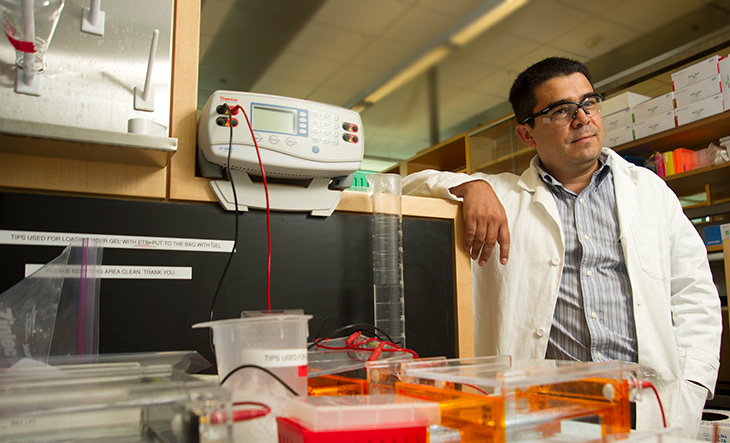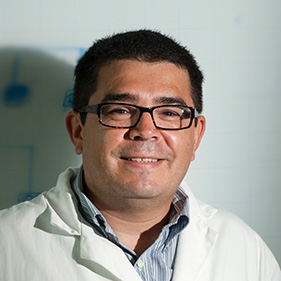Study finds tough-to-treat tumor genes contribute to gastric cancer disparities in Latinos
Latino patients have higher rate of aggressive gastric cancers, according to new study
A study led by UC Davis Health researchers examines a striking health disparity: why Latinos in the United States are twice as likely to develop gastric, or stomach, cancer and die from it than non-Latino whites. The research was published in Cancer Research Communications.
“There is a disparity in the incidence and mortality of gastric cancer in the United States. Latinos carry among the highest burden of gastric cancer, despite the low overall incidence rate of gastric cancer in the country,” said lead author Luis G. Carvajal-Carmona. He is a biochemistry and molecular medicine professor and associate vice chancellor for the Office of Academic Diversity. “Our research is focused on finding approaches to reducing disparities in care and outcomes. It also helps us better understand the development of gastric cancer, its diagnosis and potential personalized therapeutic approaches.”
Gastric cancer, in which cancer cells form in the lining of the stomach, is linked to age, diet, stomach diseases such as gastritis and ulcers and genetic risk factors.

Detecting a subtype with the worst prognosis
The researchers took 115 tumor biopsies from 32 patients, the majority of which were from Mexico, Colombia and California. Using tissue from the biopsies taken from different regions of the tumor, the researchers could identify mutations in hundreds of cancer genes and understand how these cancers evolved.
The study identified a molecular subtype – known as genomically stable – in gastric tumors detected in nearly half of the Latino study participants.
“We found molecular evidence that could partially explain why Latinos do so poorly when diagnosed with gastric cancer,” Carvajal-Carmona said. “The molecular subtype we found in Latinos is the worst to have because it associates with the poorest prognosis.”
Typically, cancer genes have mutations that can be targeted with medications to treat cancer cells. But tumors with genomically stable molecular subtypes simply do not respond well to treatment.
“This subtype does not have many targets or vulnerabilities that we can use with known drugs and tends to be resistant to commonly used chemotherapies,” Carvajal-Carmona explained.
They are also not genetically diverse enough to find other targets that can be treated with targeted therapies.
Risk factors for gastric cancer
According to the National Cancer Institute, the following factors can contribute to gastric cancer:
- Helicobacter pylori (H. pylori) infection of the stomach
- Chronic gastritis (inflammation of the stomach)
- Gastric polyps
- Eating a diet high in salted, smoked foods and low in fruits and vegetables
- Being older or male
- Smoking cigarettes
- Having a mother, father, sister, or brother who has had gastric cancer
Symptoms of gastric cancer in the early stages may include indigestion and stomach discomfort, feeling bloated after eating, mild nausea, loss of appetite and heartburn. At later stages, symptoms may become more severe and include trouble swallowing, vomiting, blood in the stool, stomach pain, jaundice, unexplained weight loss and ascites (build-up of fluid in the stomach).
Gastric cancer risk widely varies by geographical region. Eastern Asia exhibits the highest rates, and North America has the lowest incidence globally.
“Unlike in other countries where overall gastric cancer incidence is high and where there are preventive programs that identify gastric cancer early, we do not have gastric cancer screening programs in this country,” Carvajal-Carmona said.
We know that Latinos tend to die more often of gastric cancer, and we think we found one of the reasons for such poor outcomes.”—Luis G. Carvajal-Carmona, professor of biochemistry and molecular medicine
The need for more regular gastric cancer screening
Without regular screening protocols in place, gastric cancer is difficult to detect. When it is detected, it is typically at an advanced stage.
That’s why researchers are focusing on studying a patient’s genetic makeup, the tumor’s DNA profile and the unique interaction between the two with the patient’s environment, diet and lifestyle. The goal is to develop ways to detect gastric cancer earlier, understand its weaknesses and develop better therapies.
“On the prevention side, in our ongoing studies of gastric cancer predisposition, we hope this data will help to develop ways of preventing or catching gastric cancer earlier,” Carvajal-Carmona explained. “Early detection is key to improving patient outcomes as treatments are more effective. Using genetics, we are trying to understand why some people get gastric cancer and others don’t. It is our hope that our studies of gastric tumors will find their vulnerabilities and the combinations of mutations that can be targeted with effective therapies, which can be moved to clinical trials.”
UC Davis co-authors included Ted Toal, Ana Estrada-Florez, Guadalupe Polanco-Echeverry, Ruta Sahasrabudhe, Paul Lott, Sienna Rocha, Alexa Morales-Arana, Shiro Urayama, Amanda Kirane and Dongguang Wei. Find a full list of co-authors in the article.
This research was supported by universities and funding agencies in Colombia, Mexico and the U.S., including the HEAL-HER Program and the National Institutes of Health (grants R01CA223978, R21CA199631, U54CA233306 and P30CA093373).





